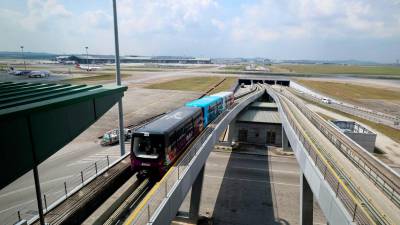KUALA LUMPUR: The recent disruptions of the Aerotrain service at Terminal 1 of the Kuala Lumpur International Airport (KLIA) were not due to mechanical failure but a minor technical issue that was resolved promptly, said Transport Minister Anthony Loke.
He said that in any system, such operational disruptions are common and must be tackled through continuous system and software maintenance.
“It wasn’t a breakdown but a technical glitch, a software bug. In any system, there will be occasional disruptions, bugs, and other issues that must be addressed and fixed.
“The disruption was resolved within 15 minutes,” he told reporters after opening the ASEAN-China International Rail Transit Forum 2025 here today.
Loke expressed regret over the disruptions in the past month but clarified that the Aerotrain service continues to record high passenger volumes, with 1.5 million passengers a month and hundreds of trips daily.
He also urged Malaysia Airports Holdings Bhd (MAHB) to pay serious attention to the contractors and vendors involved in maintaining the service.
On Monday, the media reported calls from several quarters urging the Transport Ministry to establish a special committee to investigate the cause of service disruptions, which allegedly occurred at least five times since the service resumed on July 1.
On the third-generation Electric Train Service (ETS3) project to Johor Bharu, Loke said it is progressing as planned, contrary to claims by some parties.
“It is definitely inaccurate to say there was a delay. I have already mentioned a few months ago that the ETS3 project will be implemented in phases. It is not a delay,“ he stressed.
He clarified that the ETS3 is already operational up to Segamat (first phase), while the second phase to Kluang is set to begin service before Aug 31, followed by the third phase to Johor Bahru Sentral by the end of the year.
He said the ministry is awaiting confirmation on the launch date for the second phase, as the first train will be driven by a VIP, adding that an official announcement will be made later this month.
“The ministry is committed to starting the service before Aug 31,” he added.
Meanwhile, Loke said Malaysia is looking forward to realising greater rail connectivity with China, particularly in facilitating cross-border rail freight.
He emphasised that such connectivity cannot be achieved by Malaysia alone and requires strong collaboration with other ASEAN member states, especially Thailand and Laos, to ensure seamless regional integration.
“We cannot do it alone. We must work together with our ASEAN partners to enhance connectivity between ASEAN and China,“ he said, adding that improved cooperation would strengthen logistics networks and economic ties across the region.
Earlier in his opening remarks at the forum, Loke said the event symbolises the strengthening of ASEAN-China cooperation and reflects a shared vision for a smarter, greener and more connected future.
He said the global rail sector is undergoing a renaissance, driven by climate urgency, digital disruption and economic transformation, stressing that for Malaysia, investing in rail is no longer just about infrastructure but has become a national economic and environmental imperative. – Bernama
